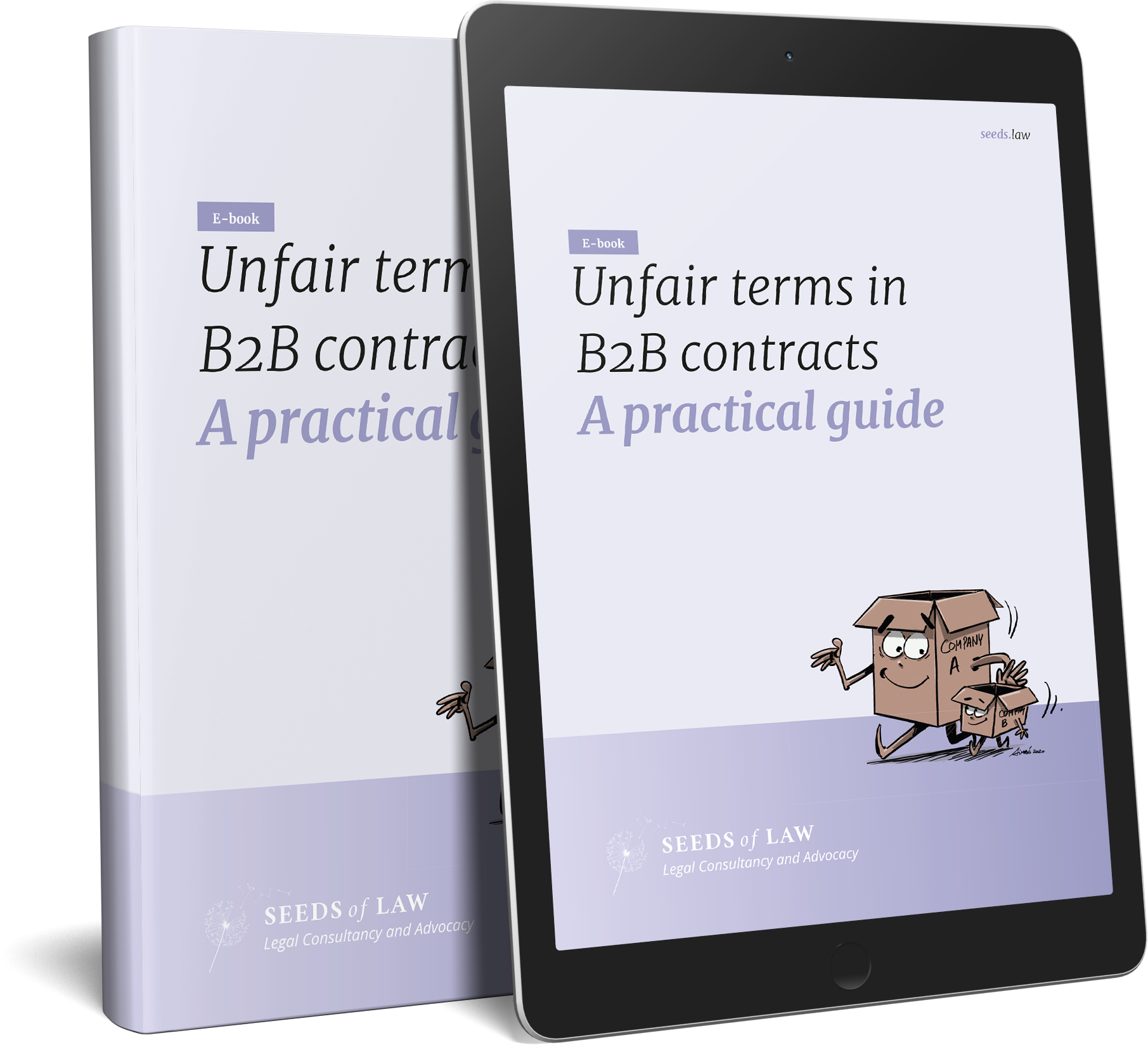- Corporate Law and M&A
- B2B , B2B contracts , company law , agreement to set up a company , shareholders' agreement , share transfer agreement , core clauses , unfair B2B terms , Unfair contract terms
Unlike in the case of financial services and public procurement, company law, and company contracts in particular, are not explicitly excluded from the scope of the new B2B law.
However, this does not mean that the B2B law can be applied unambiguously to every agreement concluded within the framework of a company. Each contract and each situation will therefore have to be examined carefully.
1. To what extent does B2B law apply to company contracts?
Only company contracts concluded between enterprises may be subject to the B2B law. But this must be examined on a case-by-case basis.
For example:
- A shareholders' agreement, in which one party involved is an individual who does have himself any economic activity, is not subject to the B2B law;
- An agreement relating to the transfer of shares, concluded between two companies, does, however, generally meet the conditions for application of the B2B law.
In other words, as soon as a company agreement is concluded by a party that is not an enterprise, the B2B rules do not apply.
2. What types of company agreements fall under the B2B law?
In the context of a business, various types of agreements between enterprises can fall within the scope of the B2B law.
Below we list the most common types of agreements which are concluded in the framework of a company.
2.1 The agreement to set up a company
It often happens that several companies decide to incorporate a company as a joint venture.
A company is incorporated by means of a legal act, in which one or more partners make a contribution. These contributions, together the assets, are used to carry out the agreed activities (the object of the company), thus creating added value for the partners.
It is clear that an agreement for the incorporation of a company, entered into by several enterprises, is in principle subject to the application of the B2B law. More specifically, this also relates to the deed of incorporation (and subsequent the articles of association) of the company.
2.2 The shareholders' agreement
Various shareholders - enterprises - may also make written arrangements concerning their shareholding in a shareholders' agreement.
In such a shareholders' agreement a wide array of arrangements are made, often creating specific imbalances between the parties.
For example, there may be (sometimes irrevocable) put options to sell shares (good leaver - bad leaver clauses, tag along and drag along clauses), preferential rights for some parties to the detriment of others, unequal voting or profit-sharing agreements, and so on.
Here too, it is best to take into account the provisions of the B2B law.
2.3 The share transfer agreement
When a shareholder (company) wants to sell its shares to another company, a share transfer agreement will be negotiated and concluded between them.
A crucial part of such an agreement relates to the representations and warranties, which (among other things) determine to what extent a selling company will be held liable to indemnify the buying company for certain matters and also establish the regime of (possible) breaches of representations with respect to the sold company.
The extent and content of these representations and warranties will depend on specific circumstances, namely the quality of the negotiations conducted, the time constraints for the (selling) party, the motivation to (re)purchase, and so on.
For this reason, it is very well possible that imbalances will arise between the rights and obligations of the contracting parties, which may be sanctioned by the B2B law. It is therefore of the utmost importance to clearly define and document the real intentions of the parties.

3. To what extent are business contracts likely to be covered by B2B law?
As soon as a "manifest imbalance" is created between the rights and obligations of the different enterprises within the framework of a company contract, certain clauses may be qualified as illegal under the B2B law and/or as a so-called grey or black clause.
For example, clauses, sometimes stipulated in shareholder agreements or share transfer agreements, provide that, in the event of a dispute, a party is deprived of its rights of recourse (e.g. when guarantees on a sale of shares are limited by so-called "caps") or result in a party being bound without giving a reasonable notice period (e.g. when certain "bad leaver" situations are met).
If such an imbalance in such clauses become manifestly too important in the light of the B2B law, taking into account all relevant circumstances, these clauses might be deemed to be unenforceable.
Although this principle should be nuanced (see below), companies should take into account the B2B law when entering into their company contracts if they do not want to be confronted with unexpected problems at a later stage. As stated earlier, it is important to clearly define the actual will of the parties and to document it properly.
4. Certain terms can end up in a vague area
In the context of the application of the B2B law to company contracts, two important nuances must be made.
4.1 The rules of company law may take precedence
During the preparatory work on the B2B law, the legislator made it clear that the interpretation of an (allegedly) prohibited term will always depend on what is specifically allowed in specific legislation, such as company law.
In other words, if a certain clause is not expressly authorised by company law, it is possible that it will be sanctioned by the B2B law.
Conversely, if company law explicitly allows a specific term that may be considered black or grey under the B2B law, company law will prevail and the relevant clause may still be legally valid, despite the B2B law.
For example, a voting agreement between shareholders – being companies – of a BV/SRL or NV/SA, which creates a manifest imbalance between the rights and obligations of the shareholders concerned and therefore falls within the scope of the B2B law, will generally still be allowed, based on the relevant provisions of company law.
Nevertheless, this depends on the factual and legal circumstances, resulting in a vague area. It has therefore become very important to be as clear and complete as possible when drafting the agreement, in order to avoid the sanctions imposed by the B2B law.
4.2 The "core clauses"
Even if the B2B law applies to a specific company contract, this does not automatically mean that this contract will be sanctionable in the event of a breach of the B2B law.
As we have already indicated, the B2B law stipulates that so-called "core clauses" cannot be tested against the general standard of testing, the so-called "manifest imbalance" between the parties’ different rights and obligations.
A core term is a term that also determines the actual subject matter of the contract and is therefore of such importance that the parties would not have entered into the contract without it.
The question is therefore whether or not a clause is a core clause.
In the case of, for example, a building contract, it concerns the price, the work to be carried out, the performance period, etc.
But for some company contracts, it is very difficult to determine unequivocally when a clause or arrangement determines the object or the essence of the contract or is of only subsidiary importance.
For example, a clause in a share transfer agreement may contain a number of representations and warranties which are of such importance to a particular company that it would not have entered into the agreement without them. For other warranties in the same contract, the reverse may be true.
The alleged qualification of such clauses will therefore open discussions.
We cannot emphasise enough that it is therefore extremely important, when negotiating contracts, to describe the intentions and arrangements as clearly as possible and to document them well. It is also important to act diligently during the execution and enforcement thereof, in order to exclude, as much as possible, possible risks related to the B2B law.
5. Conclusion
When entering into certain types of company agreements, it is best to check whether, and to what extent, the B2B law is applicable.
After all, a company contract (company formation agreement, share transfer agreement, shareholders' agreement, voting arrangements) concluded between two enterprises will fall within the scope of the B2B law.
This principle is nuanced by the particular nature of company law, which can provide a legal basis for allowing unbalanced terms. Nevertheless, in certain cases a discussion may arise on whether or not there is a "manifest imbalance".
Also, core clauses, i.e. clauses that (also) constitute the essence or object of the contract, cannot be regarded as unlawful just like that. However, the question then arises as to which clauses in a company contract can be regarded as core provisions and which cannot. On its turn this again creates a vague area with, as a result, accompanying discussions.
It has become essential to draft B2B contracts carefully in order to avoid possible sanctions. It goes without saying that our firm can advise and assist you in this respect, both in the analysis of existing company contracts and in the drafting and negotiation of your agreements, and subsequently in their implementation and enforcement. Please feel free to contact us via info@seeds.law.
False Read alsoDiscover our e-book about unfair terms in B2B contracts
In our e-book “Unfair terms in B2B contracts” you will discover a number of interesting tips to familiarize yourself with the new principles of the B2B law.





